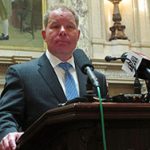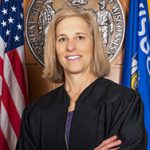MAY IT PLEASE THE COURT: Judicial candidates make their case ahead of February primary
By: Michaela Paukner, [email protected]//January 28, 2020//
MAY IT PLEASE THE COURT: Judicial candidates make their case ahead of February primary
By: Michaela Paukner, [email protected]//January 28, 2020//
 Wisconsinites will weigh in on the current makeup of the state Supreme Court in February as Justice Dan Kelly seeks election to a full 10-year term on the high court.
Wisconsinites will weigh in on the current makeup of the state Supreme Court in February as Justice Dan Kelly seeks election to a full 10-year term on the high court.
But before he can win himself a spot on that ballot, he has to best at least one rival in the state’s primary election on Feb. 18. His two challengers for his current seat are Marquette University Law School professor Ed Fallone and Dane County Circuit Court Judge Jill Karofsky.
All three candidates have been campaigning in an increasingly polarized political setting, which has affected voters’ views of the courts. More than half of the 800 registered Wisconsin voters who participated in Marquette University Law School’s first poll of 2020 said they can’t trust the government to do what is right.
A Marquette poll conducted in September found that although Americans have more confidence in the Supreme Court than any other branch of government, 36 percent of the roughly 1,400 respondents believed the justices are motivated by politics when making decisions, rather than the law.
The three candidates discussed the partisan state of the judiciary during their first debate in November. The Wisconsin Law Journal talked one-on-one with each candidate about political polarization, their experiences and what influence they might have on the state Supreme Court if elected.
Justice Dan Kelly, Wisconsin Supreme Court
Former Gov. Scott Walker appointed Kelly to the Wisconsin Supreme Court in 2016. Before serving on the high court, Kelly was a commercial litigator and founding partner of Rogahn Kelly in Waukesha. Even before then, he had been a shareholder at Reinhart in Milwaukee.
Kelly said voters should consider candidates’ experience and judicial ideas when casting their ballots. He believes justices should apply the law as it is written and without substituting their own judgment.
“If we do our jobs within that properly defined role, we’ll have our freedoms and liberties protected, and we’ll be able to maintain law and order,” Kelly said.
Kelly sees flaws in his opponents’ philosophies — or lack thereof. He said that when Fallone says he doesn’t have a philosophy, that suggests he isn’t ready to serve on the state Supreme Court. He said Karofsky has positioned herself as a “social justice warrior,” which brings her progressive politics to the bench.
Kelly believes he’s been nonpartisan in the decisions he’s made since his appointment, and he said he views the state Supreme Court as a whole as nonpartisan.
“If there is an unbroken chain of logic between the premises and the conclusion, then (Wisconsinites) can be confident that the result has been commanded by law, rather than partisan influences,” Kelly said. “Logic doesn’t care about your politics.”
Kelly puts his philosophy into practice by writing understandable opinions, which he said makes the law accessible to everyone, not just lawyers and people with legal backgrounds.
“Because I understand the authority I exercise as an arm for the people of Wisconsin, I understand that I owe them a clear explanation of what the law requires in every case that we hear,” Kelly said.
Kelly said he’ll continue to write clear, logical opinions if elected to the high court for a 10-year term.
“My hope is that one of the benefits of writing those rigorously logical opinions is that it will make it clearer and easier to apply the reasoning in those opinions to future cases,” Kelly said.
Judge Jill Karofsky, Dane County Circuit Court
Karofsky was elected to the Dane County Circuit Court in 2017. She has also worked as executive director of the Wisconsin Office of Crime Victim Services, assistant attorney general for the state of Wisconsin, deputy district attorney in Dane County and general counsel for the National Conference of Bar Examiners.
Karofsky said she’s running to remove politics from the state Supreme Court. She said she now sees justices making decisions before hearing cases and called out Kelly specifically.
“When you look at Dan Kelly’s jurisprudence, what you see is a justice who is making the decisions because he wants to get to a certain outcome,” Karofsky said.
She cited state Supreme Court decisions in administrative rules cases in 2016 and 2019. She said the most recent is “180 degrees different” from the decision of 2016, but the only change was the makeup of the court.
“What we need in the law is stability and predictability,” Karofsky said. “When things aren’t stable and predictable, people’s confidence in the justice system is eroded. It’s not a place where you can go to resolve conflict.”
Karofsky said her record proves she follows the rule of law in every case. She called herself a consensus builder who will use her experience from trial court to rule with citizens in mind.
“Because I have been on the front line of the justice system for much of my career, I see how the law impacts people,” Karofsky said. “It’s not an esoteric exercise. When we’re doing something like interpreting the constitution, we need to do it with today in mind.”
As the only trial court judge in the race, Karofsky said her opponents can’t match the depth and breadth of her experience.
“I heard more than 1,700 cases last year,” Karofsky said. “If you combine the number of cases (my opponents) either presided over or litigated as attorneys, they can’t come close to the thousands of cases I have handled as an attorney and a judge.”
Professor Ed Fallone, Marquette University Law School
Fallone has been teaching at Marquette Law School for more than 25 years. Before teaching, he practiced law at Fried Frank Harris Shriver and Jacobson in Washington, D.C. He has served on boards for the State Bar of Wisconsin, the Wisconsin Trust Account Foundation, Voces de la Frontera Accion and Catholic Charities Legal Services for Immigrants.
Fallone ran against Chief Justice Pat Roggensack in 2013. He said he was then concerned about the court’s dysfunction and political divisions — a situation he says is as bad, if not worse, now.
“I can work effectively to build consensus on the court, and that’s going to be my goal — to reduce the number of fractured opinions where you have multiple justices writing separately,” Fallone said.
Fallone said he’s running a nonpartisan campaign and not making personal attacks on his opponents. His primary goal is to inform voters of both his specific viewpoints and his legal experience in constitutional, criminal and business law.
Fallone doesn’t believe in having a single judicial philosophy. He said the term has become an opportunity for conservative candidates to claim they follow the law as written, even as liberal candidates claim an evolving interpretation of the constitution.
“I’m not going to pretend there’s just one way to approach legal issues,” Fallone said. “What’s more important is to have judges on state Supreme Courts that have different perspectives, who bring different views of the law. That’s where you’re going to get the interaction and exchange of views that’s going to lead to a better interpretation and a better outcome.”
Fallone said Wisconsin hasn’t had a state Supreme Court justice who was a racial or ethnic minority in more than 10 years. He’d be the first Latino elected to the high court in state history.
“In order for the justice system to be legitimate in the eyes of the community, all members of the community need to be able to see themselves reflected in the justice system,” Fallone said. “It does undermine confidence in the judiciary when it lacks diversity.”
The candidates will participate in another debate ahead of the primary election. The Milwaukee Bar Association is hosting the moderated forum on Jan. 30 from noon-1 p.m at its office.
Legal News
- Former Wisconsin college chancellor fired over porn career is fighting to keep his faculty post
- Pecker says he pledged to be Trump campaign’s ‘eyes and ears’ during 2016 race
- A conservative quest to limit diversity programs gains momentum in states
- Wisconsin prison inmate pleads not guilty to killing cellmate
- Waukesha man sentenced to 30 years for Sex Trafficking
- 12-year-old shot in Milwaukee Wednesday with ‘serious injuries’
- Milwaukee man convicted of laundering proceeds of business email compromise fraud schemes
- Giuliani, Meadows among 18 indicted in Arizona fake electors case
- Some State Bar diversity participants walk away from program
- Wisconsin court issues arrest warrant ‘in error’ for Minocqua Brewing owner
- Iranian nationals charged cyber campaign targeting U.S. Companies
- Facing mostly white juries, are Milwaukee County defendants of color truly judged by their peers?
WLJ People
- Power 30 Personal Injury Attorneys – Russell Nicolet
- Power 30 Personal Injury Attorneys – Benjamin Nicolet
- Power 30 Personal Injury Attorneys – Dustin T. Woehl
- Power 30 Personal Injury Attorneys – Katherine Metzger
- Power 30 Personal Injury Attorneys – Joseph Ryan
- Power 30 Personal Injury Attorneys – James M. Ryan
- Power 30 Personal Injury Attorneys – Dana Wachs
- Power 30 Personal Injury Attorneys – Mark L. Thomsen
- Power 30 Personal Injury Attorneys – Matthew Lein
- Power 30 Personal Injury Attorneys – Jeffrey A. Pitman
- Power 30 Personal Injury Attorneys – William Pemberton
- Power 30 Personal Injury Attorneys – Howard S. Sicula














